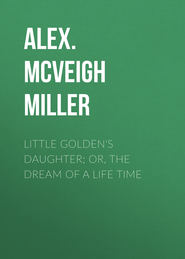По всем вопросам обращайтесь на: info@litportal.ru
(©) 2003-2024.
✖
The Senator's Bride
Настройки чтения
Размер шрифта
Высота строк
Поля
"Yes."
She looked at him sadly as she leaned across the crib near him, but not touching him.
"Paul," she ventured, suddenly, "even supposing that I had loved another before I ever met you, what difference can that make to you? I love you truly now."
"So much difference, my wife, that I think I could never again be happy if I knew you had ever loved another than myself; but I cannot bear this suspense. I ask you nothing about other men. I only ask you, did you ever love Bruce Conway?"
She could not utter a falsehood; she could not escape his keen, persistent questioning; she must be frank with him and hope for the best. That was the only way the poor little heart reasoned then; so with down-dropped eyes, and a sound in her ears that recalled the whisper of the ocean in her ears one parting night, she drew a little farther away from him, and answered, in a hushed, low voice, much like a chidden child's:
"I did."
A silence fell between them so hushed that she could hear her own heart beat. He had put up his hand to his face, and she could not see his features nor guess what effect her words had on him.
"Paul," she ventured, almost frightened at the sound of her own voice in the stillness, "don't think of it any more. I was nothing but a simple, dreaming child, and it is just as natural for a young girl to fancy herself in love with the first handsome young man who flatters her as it is for our baby there in his crib to cut his teeth and have the measles when he grows older. It seems absurd to make yourself miserable over so trifling a thing. I didn't like him so very much, indeed I didn't. I soon learned how unworthy he was of any woman's love. He is a fickle, wavering, unprincipled man, who never knows his own mind, unworthy a second thought of yours, my noble husband."
Unflattering verdict! but a true one. She understood the man who had trifled with her young heart almost better than he did himself. In that time when he had wavered so fatally between his pride and his happiness she had fathomed his very soul with her suddenly awakened perceptions, and she understood him well. She could look back now and thank Heaven for what had seemed then a calamity scarcely to be borne. What it had cost her only Heaven knew, for in her way she was a proud woman, and never "wore her heart on her sleeve;" but nobody stops to question how hard a struggle has been so that victory crowns it at last. To the world it matters little who of its toiling, striving atoms have been patient pilgrims to
"That desert shrine
Which sorrow rears in the black realm—Despair!"
so that they return with palms of victory in their hands and the cross of honor upon their breasts. And Gracie, too, had fought a battle in her life and conquered; if it left ineffaceable scars they were hidden in her heart and left no token upon her fair, inscrutable face.
He made no reply to her wistful defense.
She went up to him and touched his hand with hers, still intent on making peace with this proud, impatient spirit. He only put her very gently but firmly away from him, and in a moment after turned suddenly and left the room. She heard him go down to his study, close his door, and fall heavily into a chair.
Then her repressed impatience and anger broke out, as she paced back and forth, like a spirit, in her flowing hair and long white robe.
"The idiot! the madman! to come back here after all this time, and throw the shadow of that unhappy love all over my future life! Did he think that I had no pride? that I would bear coldness, carelessness, neglect, and be glad to meet him after four years had passed, and say yes to the question that in all honor he should have asked before he went? I think I could spurn him with my foot if he knelt before me again as he did to-night!"
How she scorned him! How superb she was in her just anger and resentment! Her changeful eyes darkened and flashed with pride, her lip curled, her cheek glowed, her light step seemed to spurn the floor.
"Mamma, mamma!" The soft, frightened voice of her child, waking suddenly from his rosy sleep, recalled her to herself. In an instant she was by his side, bending over him, kissing his brow, his lips, his hands, his hair, in a passion of grieving tenderness.
"My darling, my comfort, my pretty boy! I am so glad that you are a boy! You will never know the pains, the penalties, the trials and crosses of a woman's life. If you were a little girl, and I knew that if you lived you must bear all that I have borne and must still endure, I could bear to see you dead rather than live to say, as I have done: 'Mother, why didn't you let me die when I was a little child?'"
The little clock on the marble mantel chimed out the hour of three in soft musical notes. She lifted the child in her arms, and, passing into her sleeping apartment, laid him down on her own bed, for she never slept without her treasure in her arms. Then, kneeling by his side, she whispered a brief, agonized petition to Heaven before laying her tired form down in the snowy nest of linen and lace.
When the soft summer dawn began to break faintly over the earth, Paul Winans rose up from his tiresome vigils and stole up stairs with a noiseless footstep that did not waken her from her exhausted sleep. Her child nestled close to her heart, and her lips, even in her fitful slumber, were pressed upon his brow just as she had fallen asleep. The long curls of her golden hair flowed over both, and wrapped them in a mantle of sunshine. Her face wore a look of remembered pain and grief that went to his heart, as kissing both so softly that they did not stir, he laid a note upon the pillow, and went down the stairs and out into the street.
CHAPTER IV.
RENUNCIATION
"Am I mad that I should cherish that which bears but bitter fruit?
I will pluck it from my bosom, though my heart be at the root!"
—Tennyson.
A misty, overcast morning dawned gloomily after the night of Mrs. Conway's ball. In spite of it the lady rose early. She had not slept at all, and, nervous and depressed, she roamed over the disordered house, from which the servants were busily removing the debris of the evening's entertainment. Every moment she expected to see her nephew enter, and as the day wore on and he failed to present himself, her impatience brooked control no longer, and she sent a messenger into Norfolk to the National Hotel, his usual stopping-place in the city, to inquire after him.
The boy's swift horse carried him into the city and back in two hours. He came into the lady's presence bowing and grinning, the very picture of a sleek, good-natured, well-fed darkey.
"Did you see him, John?"
"Yaas'm, I see him," grinned John, his hands in his pockets complacently jingling the nickels his young master had just bestowed on him.
"You gave him my message? What did he say?"
"Yaas'm; he say as how"—here John stopped jingling his nickels long enough to make a low dip of his woolly head, as befitting the proper deliverance of the message he had—"he will do heself de hon'r ob takin' tea wid you dis even."
"Was that all he said?"
"All he says to you, ma'am—he ast me how come I stay 'long wid ole mis' all dis time, and not go off like do rest of de little nigs? I tell him–"
Here John stopped to chuckle softly at the remembrance.
"Well, you told him what?"
"As how old mis' couldn't git 'long 'thout me nohow," and here John turned and made a hasty exit in obedience to a "Go along, you impudent little monkey!" from the said "ole mis'."
He was at the gate that evening, ready to take his master's horse when he cantered up in the gloom of the overcast sunset.
"Glad to see you, Marse Bruce. Hopes you've come to stay. De ole place nuvver seemed like home without you," said the young darkey, who as a boy had blacked Bruce Conway's boots, run his errands, served as an escape-valve for all his ill humors, and withal adored him, now welcoming him home with the hearty affection that was so deeply rooted in his simple nature.
Freedom had not spoiled John in the least—possibly because so far as kind treatment and almost unlimited indulgence went, he had been free all his life.
But the young man merely threw him the reins, and with a careless "Take good care of him, John," walked off in the direction of the house.
"Humph!" commented the merry little darkey, as he led the horse off to the stable. "Sulky! I dersay he's come to give the madam fits for lettin' of his sweetheart git married afore he come back. Serves him right, though. Why didn't he marry her fust, and take her 'long wid him to that furrin parts? Poor, pretty little dear! she did look just like an angel las' night, and they do say Marse Bruce took on some when he seen her."
For the servants had all been woefully disappointed when Bruce hurried off to Europe without the grand wedding that the cook had prophesied would take place between himself and Miss Grey; and the story of the last night's contretemps having been duly rumored from parlor to kitchen, was the all-absorbing subject of comment between cook, chambermaid, and boy-of-all-work—their sympathies and indignation being in such a fluctuating state just now that they could hardly decide who was the most deserving of their sympathy—the young man who, as they phrased it, had gone off and apparently jilted his sweetheart, or the young lady whom he had returned to find had really jilted him.
And the young man who was furnishing food for so much feminine gossip and conjecture that day, quite heedless of it all, walked on up the steps and into the stately presence of his expectant aunt.
She came forward very cordially, concealing any possible annoyance she felt under an appearance of affection. She began to see that reproaches and anger were not the way to bring this vacillating, reckless young fellow to his senses.
"I trust you are feeling well after your fatigue of last evening," he pleasantly observed, as they shook hands.
"No, I cannot say that I am. I have had no sleep, and felt worried and anxious about you, my dear boy."
"I am sorry to have caused you any such annoyance," he answered, repentantly, throwing himself wearily among the cushions of a luxurious sofa—"very sorry, indeed, Aunt Conway. I am not worth being a source of anxiety to any one."
The inflection of sadness and weariness in his tone touched her heart, and swept away all lingering resentments. She looked at him as he lay among the bright embroidered cushions, looking so handsome, yet so worn and hopeless, and her womanly pity found vent in the simple words:
"My poor boy!"
"Don't pity me!" he answered, impatiently. "I am not deserving of pity, and I don't want it. A man must sink very low, indeed, to become the object of a woman's pity."











